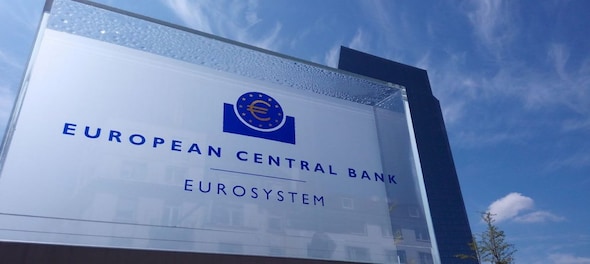
The European Central Bank left interest rates unchanged for a fourth meeting as a softer outlook for inflation and economic growth fed expectations for cuts to begin in June.
The deposit rate was kept at a record 4% — as all economists surveyed by Bloomberg predicted. The Governing Council reiterated that maintaining this level of borrowing costs for “sufficiently long” will make a “substantial contribution” to returning consumer-price growth to the 2% goal.
#NewsFlash | European Central Bank (#ECB) keeps interest rate unchanged at 4.5% pic.twitter.com/USRVNNIKCG
— CNBC-TV18 (@CNBCTV18Live) March 7, 2024
“The Governing Council will continue to follow a data-dependent approach to determining the appropriate level and duration of restriction,” the ECB said Thursday in a statement. “Although most measures of underlying inflation have eased further, domestic price pressures remain high, in part owing to strong growth in wages.”
The euro slipped after the decision, trading down 0.2% at $1.0874. Traders added to bets on monetary easing, seeing 98 basis points of rate reductions in 2024 compared with about 93 basis points previously.
The ECB, like the Federal Reserve and the Bank of England, is contemplating when to sound the all-clear on inflation and begin undoing the unprecedented monetary tightening deployed to subdue it. While price growth in the 20-nation euro zone is nearing the target, policymakers there are wary of cutting too soon and want assurance that wage increases are under control.
Their latest quarterly outlook puts inflation at 2.3% this year — down from 2.7% in December — and revises the 2025 forecast down to 2%. The economy, meanwhile, is seen expanding by 0.6% in 2024 versus 0.8% previously.
President Christine Lagarde will hold a news conference at 2:45 p.m. in Frankfurt, though several officials had to participate in this week’s meeting remotely as strikes in Germany scuppered their travel plans.
Investors will look to Lagarde for signals on whether expectations for a first rate cut in June remain valid. She may also be quizzed about a festering spat with ECB staff over freedom of debate and climate policy.
June is certainly the timeline around which the majority of officials had been converging — even if some would like swifter action as the continent’s economy struggles to exit more than a year of stagnation.
For that reason, many politicians also crave looser financial conditions. “A cut in rates could help boost growth, which is low across Europe,” Italian Finance Minister Giancarlo Giorgetti said last week. “I think I’m not the only one who shares this view.”
While policymakers are more confident that inflation is receding sustainably, most deem it too soon to declare victory and want to see more data backing the retreat before giving the green light for monetary loosening.
February inflation, at 2.6%, came in a touch stronger than expected — supporting those who don’t want to rush into lowering rates. A Nowcast compiled by Bloomberg Economics, however, shows March inflation at 2% — suggesting the ECB is closer to its target than it may think.
Whatever the reality, most policymakers are keen to examine the drip feed of wage data due over the coming months before acting. They even include doves like Greece’s Yannis Stournaras, who said recently that the ECB “won’t have enough information” to decide on cuts before June.
In the US, the Fed “does not expect that it will be appropriate to reduce the target range until it has gained greater confidence that inflation is moving sustainably toward 2%,” Chair Jerome Powell said Wednesday.
The Bank for International Settlements is similarly circumspect, warning this week that the current dominance of services in overall price growth may lead to more stubborn inflation and demand tighter policy.
Check out our in-depth Market Coverage, Business News & get real-time Stock Market Updates on CNBC-TV18. Also, Watch our channels CNBC-TV18, CNBC Awaaz and CNBC Bajar Live on-the-go!


BJP's Hindi heartland dominance faces test in phase 3 polls
May 2, 2024 9:14 PM
Lok Sabha Election: Re-elections at a Ajmer booth after presiding officer misplaces register of voters
May 2, 2024 4:54 PM

